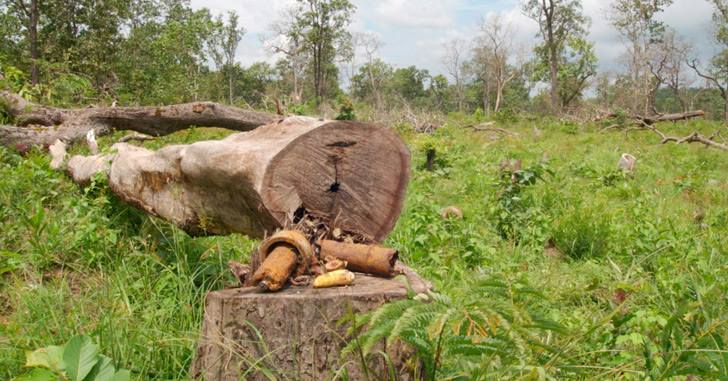Opinion: Cambodian press and some environmental groups have largely viewed the government’s creation of a committee to curb illegal logging as a sign of real progress. But upon closer inspection, the crackdown may be more of a shakedown
Last month, Cambodia’s prime minister created a national committee charged with curbing the illegal wood trade on the country’s eastern border with Vietnam, and the government and military conducted raids to seize illicit timber and investigate high-profile business leaders allegedly involved in the trade.

While the Cambodian press has described the move as a “crackdown” and some environmentalists hailed it as a “good first step” toward curtailing illegal logging, there may be much less than meets the eye going on here.
At first glance it might appear that the Cambodian government is taking a principled stand on forest protection. Revelations that timber exports to Vietnam reached $386m in 2015 – 50% higher than the previous year – were made more shocking by evidence that this trade was mostly illegal and largely targeted the country’s rarest and most endangered wood species.
But observers familiar with the situation insist that the campaign’s true motives can be traced to simmering rivalries and jostling among the most influential players in Cambodia’s logging sector.
It appears likely that this latest effort to disrupt illegal logging, though highly publicised, represents less of a crackdown and more of a shakedown. The whole episode might be no more than the latest turf war between Cambodia’s biggest logging cartels to renegotiate how the fruits of the illegal trade get divvied up.
One cause for scepticism is a 2014 agreement granting logging baron Try Pheap the exclusive right to buy up wood confiscated by the Cambodian government at below market prices. Obviously, such a scenario removes any illusion of protecting the forests.
Environmentalists in Cambodia have for years expressed concern about ties between the country’s most prominent logging bosses and prime minister Hun Sen. In 2007, when the NGO Global Witness published a report entitled Cambodia’s Family Trees: Illegal logging and the stripping of public assets, the government responded by ordering all copies of the report seized and destroyed. (It had already banned the organisation from entering Cambodia after a 2005 report questioned the prime minister’s connections to logging.)
As recently as November 2015, the prime minister went to bat for Try Pheap and another tycoon when he publicly denied allegations that the two had illegally logged in a national park along Cambodia’s borders with Vietnam and Laos. And soon after the government began its new campaign, the Cambodia Daily reported that one Facebook user found himself embroiled in a defamation lawsuit after posting allegations that Hun Sen’s family was complicit in the illicit wood trade.
Another reason to remain wary is the lack of information emerging from these high-profile military raids. Weeks after the formation of the illegal logging committee, we’ve yet to see any official statement about the outcome of the crackdown – what was confiscated and where. As one sceptical lawmaker put it: “The crackdown is like a storm. It will last only a short period of time and [then] be gone.”
Misgivings about whether illegal actors would be held accountable were reinforced last week, when stockpiles of timber in an eastern province were burned in a suspected attempt to destroy evidence of wrongdoing. The Phnom Penh Post cited accusations by local residents linking the wood to businessman Seong Sam Ol, whom the government has reportedly identified as a primary target of the crackdown.
The fact that this latest campaign does explicitly target at least some of the most powerful tycoons – a privileged class regarded by many as ‘untouchable’ – is what sets this episode apart from similar spectacles in the past. The crackdown might reveal an escalation of infighting within that group. But don’t be surprised if, in the end, it’s the smaller loggers and low-level actors who get caught up in the dragnet, while the big players are left alone to consolidate their monopoly on the illicit trade and renegotiate the balance of power. Previous “crackdowns” that followed that pattern have failed to produce meaningful results.
One thing is certain: we won’t see real change until the true orchestrators of illegal logging are held accountable. As long as these high-level culprits continue to operate in the sector, Southeast Asia’s most precious forests remain under imminent threat, and any sustainable forest management or protected area scheme is bound to fail.
Kerstin Canby is the Director of the Forest Trade and Finance program at Forest Trends
This story is reprinted by permission from Ecosystem Marketplace. It first appeared on the Forest Trends blog

